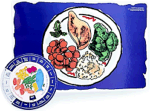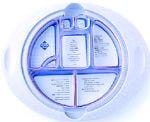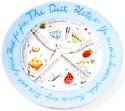Baba Ramdev Weight Loss Diet Chart in Hindi
Hate diets? Then you'll love this. Instead of counting calories or multiplying fat percentages (and tearing your hair out), try this amazingly simple weight loss concept: Look hard at your plate. Divide it into two sections; fill about half or more with vegetables and/or fruits and the remainder with roughly equal amounts of starch and a high-protein food. Then watch the weight come off. Even better, this way of eating may help prevent cancer, heart disease, and other common killers. Our reader testers dropped pounds, got fitter, and felt better after just 2 months of following this simple weight loss strategy. Now you can too.
Divvying Up Your Plate
By using your plate as a weight loss tool, you no longer have to remember confusing details about diet portions and servings, says Netty Levine, RD, a nutritionist at Cedars-Sinai Medical Center in Los Angeles.
That's the beauty of this divided-plate concept: built-in portion control. "You fill the divided plate once. If you're still hungry, have another plate of vegetables, and then you're done. It's that simple," says Levine. And with a plate half filled with vegetables, there's no room for the megacalorie, gigantic burgers and pasta "hills" notorious for contributing to the obesity epidemic.
"Everything today is supersized, and people are confused about how much they really should eat," says Nancy Vuckovic, PhD, investigator at Kaiser Permanente Center for Health Research in Portland, OR. "The overweight people coming into my office are not eating a cheeseburger, they're eating supersized meals with giant burgers, mounds of fries, and huge sodas," says Levine. The divided plate strategy eliminates this problem, since there's simply not room for all that meat and starch when half the plate is filled with veggies and/or fruits. It brings out-of-control portions back down to size. And you're still eating enough food to feel full and satisfied.
Breakfast Plate Power
You still think in terms of fruits/veggies, starch (whole grains), and protein (milk or eggs), but they don't always fit neatly on a plate. Remember: You're still aiming for half or more of the meal to be fruits and veggies.
Here are some sample meals:
Fruit-topped whole grain cereal with milk and a glass of orange juice
Vegetable-stuffed three-egg-white omelette with whole grain toast and fruit or juice
Two whole grain waffles smothered in chopped fruit with yogurt or milk
Fruit or juice with a small bran muffin and low-fat milk
[pagebreak]
Lunch Plate Power
The rule remains for weight loss: At least half of your meal should be vegetables and fruits. (When using a plate, opt for a traditional 8-inch luncheon plate.) Consider bread, tortillas, potatoes, or beans as your starch (beans double up for both starch and protein). Make a pledge to always finish your veggies or fruits first. If you have room, you can finish the rest of your meal.
Some sample meals:
Sandwich filled with two or three slices of lean meat, poultry, a few spoonfuls of reduced-fat tuna salad, or a veggie burger patty, with a salad, fruit salad, or vegetables
Black bean, lentil, or other bean-based soup with a salad or side dish of vegetables or fruits
Baked potato with a cup of broccoli or other vegetable and reduced-fat cheese
Large salad topped with grilled chicken/lean beef/seafood (deck-of-cards-size portion) and one or two slices of whole grain bread
Burrito. One tortilla stuffed with beans and chicken with a salad or large side dish of vegetables or fruits
Dinner Plate Power
You're in luck when you've got the good ol' meat/vegetables/starch offering, but casseroles and other mixtures take some imaginative dissection. Just remember the half fruits and veggie rule, and you're good to go.
Some sample meals:
Traditional meat and potatoes. About half of the plate: salad or cooked vegetables; one-third to one-quarter of the plate: deck-of-cards-size fish, poultry, or lean meat; final quarter: rice, roll, polenta, or other starch
- Lasagna, tuna noodle casserole, or other starchy mixed dish. Make it about one-third of the plate total, no more than a cup's worth, and fill the other two-thirds with salad or vegetables.
Stir-fry. Make it three-quarters vegetables and one-quarter meat, poultry, or seafood. Fill the plate three-quarters with stir-fry and one-quarter with rice.
Pasta. Stretch 1 or 1 1/2 cups of pasta with an equal amount or more of vegetables. Throw in a few pieces of shrimp, chicken, or soy "meat" for protein and flavor. Sprinkle Parmesan or low-fat cottage or ricotta cheese on top.
[pagebreak]
Restaurant Tips
The key to weight loss here is communication with the server.
Bring in a quick sketch of the ideal plate; let the waiter guide your choice. In fast-food restaurants and diners where the staff may not be helpful, order a la carte or side dishes in the proportions you want.
Inquire about portion size; if it's huge, ask the waiter to split yours in half in the kitchen and refrigerate the doggy bag. Or split it with your dinner partner.
Rotisserie chicken joints are easy in terms of plate division, but beware the creamed spinach and roasted potatoes, which are loaded with fat. Get the mixed vegetables or corn (unless it's creamed).
There's one potential pitfall to the plate concept: piling food up too high. The rule here: Go sky-high with fruits and veggies if you like; but keep the portions of starch and protein to no more than 3/4 to 1 inch high.
This plan helped Donna Rosen, a 57-year-old Cleveland homemaker with diabetes, lose 80 lb.
"That plate tells me, 'You want noodles? Fine, here's how much you can have.' Without it, I'd double or triple my portions. I lose control easily, so I need something to guide me," she confesses.
The plate is designed to provide 400- to 500-calorie meals, says co-inventor Kim Gorman, RD, a research dietitian and exercise physiologist at Akron City Hospital in Ohio. She says that the plate has helped her patients lose 20 to 50 lb over a 6-month period. "Most have dieted every which way including lots of fad diets, and they were ready to throw in the towel," she says. The reason this method works when diets fail, according to Gorman and Levine, is that people finally learn how to eat in a healthy way. "It's eating instead of dieting; people learn to make a balanced meal, and they can include foods they like, just not excessive amounts of them," explains Gorman.[pagebreak]
Prevent Disease Too!
Not only are dietitians using divided-plate plans for weight loss, but the American Institute for Cancer Research (AICR) in Washington, DC, has also been harnessing the power of plates to fight cancer! In a campaign titled "The New American Plate," the AICR has released a set of free brochures as well as a placemat you can buy showing the plate portions they recommend to stave off cancer and promote weight loss (a cancer fighter in itself).
The AICR recommends portions similar to the ones described above with some slight variation. "Our rule of thumb, using a standard 9- or 10-inch dinner plate: Plant-based foods such as vegetables, fruits, whole grains, and beans should cover two-thirds or more of the plate. Meat, fish, poultry, or low-fat dairy should cover one-third or less of the plate," explains Melanie Polk, RD, director of nutrition education at AICR.
These plate strategies fight disease because of all the fruits and vegetables they include, says James Shikany, DPH, assistant professor of medicine, division of preventive medicine, University of Alabama at Birmingham. "Studies of diet and disease indicate that the quarter of the population with the lowest intake of fruits and vegetables has double the rate of the most common cancers, such as colon, breast, and prostate," he says.
While he's a big fan of all produce, Dr. Shikany suggests making the following staples in your diets: cruciferous vegetables such as broccoli and cabbage; spinach, kale, and other dark leafy greens; orange-fleshed fruits and vegetables such as sweet potatoes, carrots, peaches, and citrus fruits. "Each of these groups contains its own disease-fighting compounds," he explains.[pagebreak]
Plate Power Tools
Try these products to help you balance and size meal portions.


From the American Institute for Cancer Research (AICR): three free brochures detailing the program, with weight loss tips, recipes, and a portion wheel. A placemat with life-size drawings of vegetables, rice, and chicken on a plate is also available. Cost: brochures and wheel free; $12 for a set of four placemats. To order, call (800) 843-8114 or go to www.aicr.org.

Perfect Portions Diet Dish: a translucent dish (sectioned off for various types of food) that fits into a sturdy plastic base. Comes with 10 different disks that you slip between the base and the see-through plate that offer portion tips for different meals. Includes a wallet-size card of restaurant tips. Cost: $19.99. To order, call (888) 889-0899 or go to www.perfectportions.com.

The Diet Plate: a charming, earthenware dinner plate imported from the UK. Its pattern includes a measuring tape motif delineating the various sections of the plate (vegetables, starches, meats) and even a cheese square denoting 1/2 oz. "Salad is unlimited, and if there's not room on the plate, use a side dish," recommends inventor Kay Illingworth. Cost: approx. $30, depending on exchange rate. To order, go to www.thedietplate.com or call 011-44-1457-862446. (This is an international call.)
Janis Jibrin Janis Jibrin, RD, is a Washington, DC-based nutritionist.
This content is created and maintained by a third party, and imported onto this page to help users provide their email addresses. You may be able to find more information about this and similar content at piano.io
Baba Ramdev Weight Loss Diet Chart in Hindi
Source: https://www.prevention.com/weight-loss/a20427952/diets-and-weight-loss/
0 Response to "Baba Ramdev Weight Loss Diet Chart in Hindi"
Post a Comment